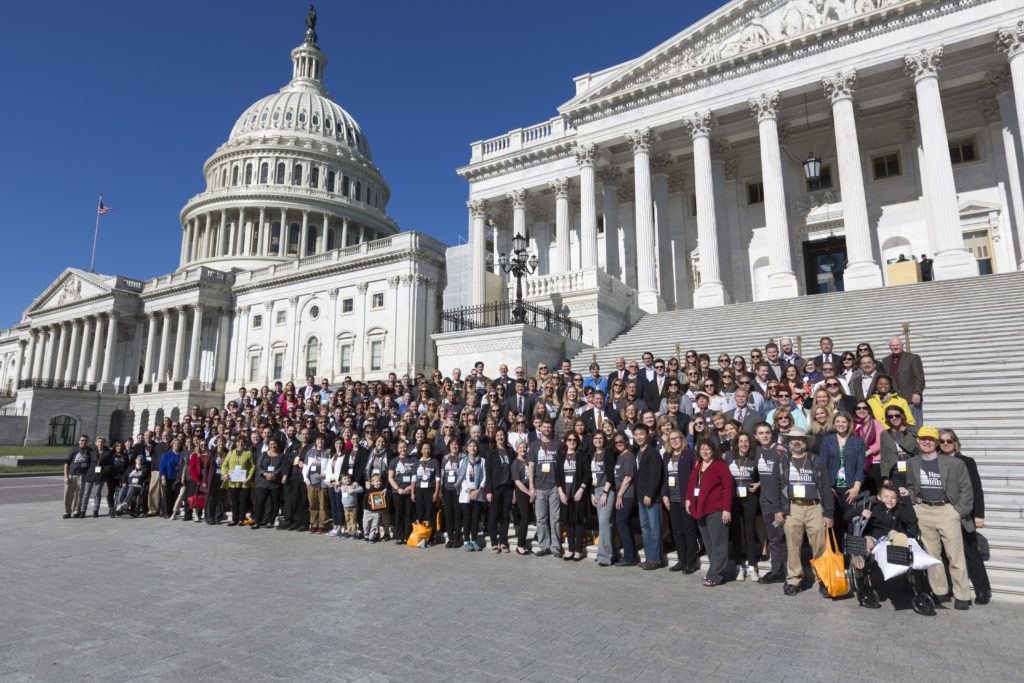For a number of years now, our Public Policy & Advocacy staff have put out monthly emails to those who’ve signed-up to be NBTS volunteer advocates, providing updates on the latest goings-on in the world of brain tumor public policy and issues related to legislation that impacts this community.
As our advocacy program continues to grow, the ranks of our volunteer advocates expand, and the policy issues we address become more intertwined with other vital areas of brain tumor care, research, and community, we wanted to begin sharing this updates with a larger audience.
Below are highlights of some new developments in the brain tumor public policy advocacy, compiled by NBTS Research & Advocacy Manager, Kacey Troy Ribnik, and Director of Advocacy, Lainey Titus Samant:
Childhood Cancer STAR Act Passes the Senate
On March 22nd, the U.S. Senate has passed the Childhood Cancer STAR Act (S.292) by unanimous consent. The STAR Act will help stimulate more effective pediatric brain tumor research and could lead to better treatments that extend life and improve patients’ quality of life.
The bill will now move to the U.S. House of Representatives (H.R.820), where we are urging representatives to take swift action to pass this bill, and send it onto the president’s desk so that it may be signed into law.
> Send a message to your Representative now!
This is also a great opportunity to thank your Senators for supporting the brain tumor community. Please take a moment to send a message to your Senators thanking them for supporting the Childhood Cancer STAR Act, which will make a difference to pediatric brain tumor patients now and in the future.
Fiscal Year 2018 Spending Bill Passes with Increases in Medical Research Funding
Congress has passed a spending bill for Fiscal Year 2018 (FY18) which includes a $3 billion increase to the National Institutes of Health (NIH) – its largest single-year increase in over a decade. The bill also includes $5.9 billion for the National Cancer Institute, an increase of $275 million over its base funding level from FY17, plus $300 million in 21st Century Cures Act funding.
The Department of Defense’s Peer Reviewed Cancer Research Program (PRCRP) received $80 million for FY18, which is a $20 million increase over last year’s budget. It also included the fundable research topics we advocate for: pediatric brain tumors and brain cancer.
> View our full statement on this exciting news
Send a customizable “thank you” to your members of Congress who showed their support once again for the NIH, which is the largest funder of brain tumor research in the world, and for the PRCRP, which continues to dedicate millions of dollars each year to pediatric brain tumor and brain cancer research.
Register Today for Head to the Hill!
Registration is closing soon for Head to the Hill, the National Brain Tumor Society’s signature advocacy event. This inspiring event brings together volunteers from across the US to advocate for the brain tumor community on Capitol Hill and use our most valuable tool – our voices – to influence legislation that impacts the brain tumor community now and in the future. This annual event will be held in Washington, D.C. on May 6-8, 2018. Learn more about Head to the Hill and REGISTER NOW for the event! Please email advocacy@braintumor.org or call 520.762.4544 for more information.
Web Training: Advocate for Medical Research Funding
View the recording of this educational web training, which provides an overview of how and why the federal government funds medical research through the National Institutes of Health (NIH), the National Cancer Institute (NCI) and the Department of Defense’s Congressionally Directed Medical Research Program.
You’ll learn why advocating for this funding is crucial to advancing research for brain tumors, how the Congressional budget process works, and how we as advocates can influence how the government appropriates funds for specific programs.



